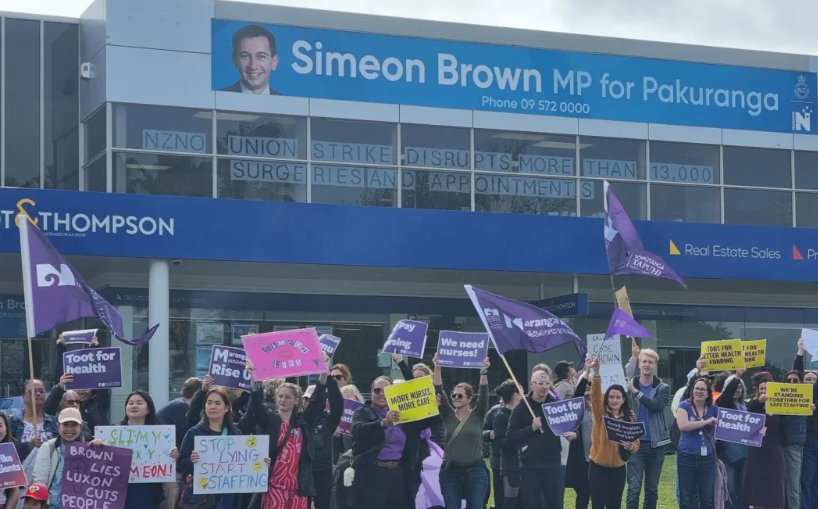Politics
Nurses Strike in New Zealand, Postponing Thousands of Procedures

More than 36,000 members of the Nurses Organisation (NZNO) are striking in New Zealand, disrupting healthcare services across the nation. The strike, which runs from 7:00 a.m. to 11:00 p.m. on Tuesday and Thursday, has led to concerns about the postponement of over 13,000 surgeries and appointments. Health New Zealand estimates that 2,250 planned procedures, 3,600 first specialist appointments, and 8,000 follow-up appointments will be delayed as a result of the action.
The strikes are the culmination of nearly a year of stalled negotiations between the NZNO and Health New Zealand, with the latest industrial action following a 24-hour strike that took place in late July. Nurses are protesting against low staffing levels and safety concerns, with many expressing that the current situation is unsustainable.
Nurse and NZNO delegate Debbie Handisides highlighted the dire circumstances faced by nursing staff. Speaking to The Press, she remarked, “I just spoke to two young nurses at today’s strike, and one of them had done the afternoon shift yesterday and then stayed and did the night shift before coming to the strike. It is unsafe, and it will mean that, sadly, mistakes may be made.” Handisides added that families are being asked to stay with their loved ones in hospitals due to insufficient staff availability, underscoring the crisis in patient care.
Addressing the financial aspect of the strike, NZNO President Anne Daniels stated that nurses are seeking a pay rise exceeding 3 percent to keep pace with the rising cost of living. “A less than 1 percent pay offer is effectively a pay cut,” she explained.
In contrast, Dr. Richard Sullivan, Chief Clinical Officer of Health New Zealand, indicated that he had not previously heard the nurses’ demand for a 3 percent pay increase until it was publicly mentioned during a radio interview. He expressed a willingness to engage in discussions with the NZNO, stating, “It was great to hear a number because we have been asking the union for some time about what it would take to settle this agreement.”
Despite ongoing discussions, Daniels claimed management has not provided assurances regarding safe staffing levels, which are critical for patient safety. “It’s unprecedented to have two full-day strikes within one week,” she noted. Daniels also criticized the Health Minister for encouraging negotiations while failing to present any new proposals.
During the strike, hospitals and emergency departments will remain operational, albeit with a limited number of staff to provide essential services. Health New Zealand has advised that individuals requiring non-emergency care should first contact their general practitioner or call Healthline at 0800 611 116. All emergency departments will be open, and patients currently hospitalized will continue to receive safe care. Unless notified otherwise, patients are encouraged to attend any scheduled outpatient appointments or treatments.
As the strikes continue, the demands from nurses highlight the critical need for systemic changes within the healthcare sector in New Zealand, focusing on both adequate staffing and fair compensation.
-

 World4 months ago
World4 months agoTest Your Knowledge: Take the Herald’s Afternoon Quiz Today
-

 Sports4 months ago
Sports4 months agoPM Faces Backlash from Fans During Netball Trophy Ceremony
-

 Lifestyle4 months ago
Lifestyle4 months agoDunedin Designers Win Top Award at Hokonui Fashion Event
-

 Entertainment5 months ago
Entertainment5 months agoExperience the Excitement of ‘Chief of War’ in Oʻahu
-

 Sports4 months ago
Sports4 months agoLiam Lawson Launches New Era for Racing Bulls with Strong Start
-

 World5 months ago
World5 months agoCoalition Forms to Preserve Māori Wards in Hawke’s Bay
-

 Health4 months ago
Health4 months agoWalking Faster Offers Major Health Benefits for Older Adults
-

 Lifestyle4 months ago
Lifestyle4 months agoDisney Fan Reveals Dress Code Tips for Park Visitors
-

 Politics4 months ago
Politics4 months agoScots Rally with Humor and Music to Protest Trump’s Visit
-

 Top Stories5 months ago
Top Stories5 months agoUK and India Finalize Trade Deal to Boost Economic Ties
-

 Health2 months ago
Health2 months agoRadio Host Jay-Jay Feeney’s Partner Secures Visa to Stay in NZ
-

 World5 months ago
World5 months agoHuntly Begins Water Pipe Flushing to Resolve Brown Water Issue









